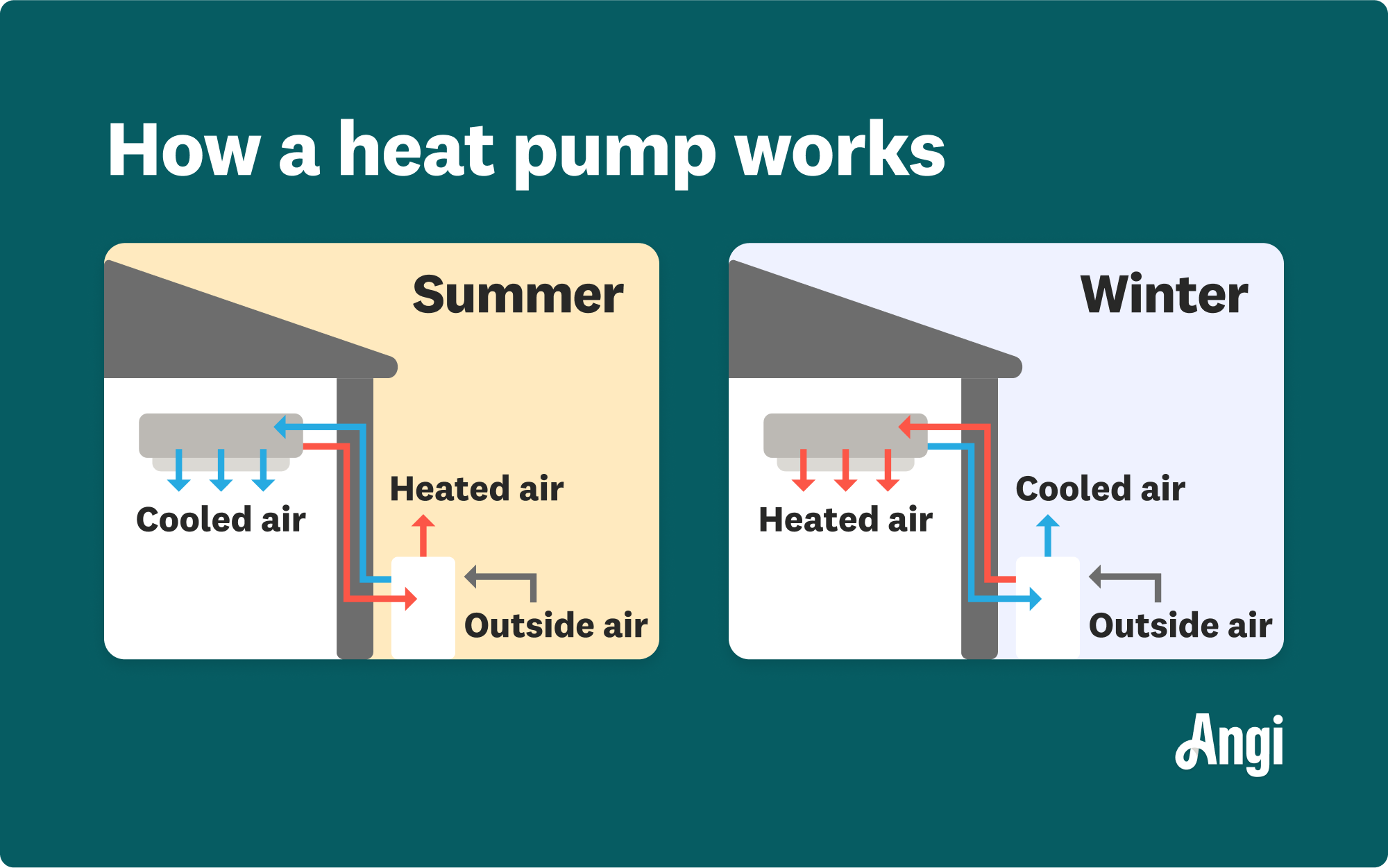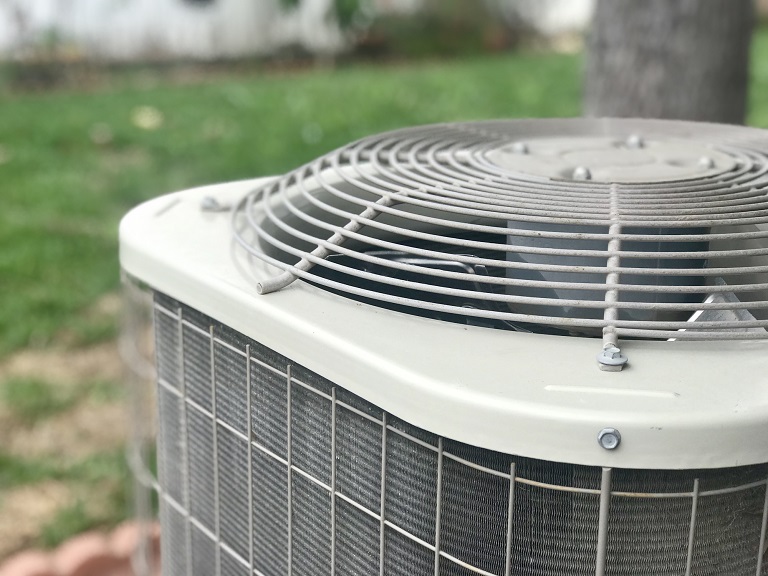
What you’ll pay in Columbus, OH, for furnace repairs depends on many factors. Here’s a breakdown of what can go wrong and the cost to fix those issues.
Say hello to cool comfort and hot savings with a heat pump


Heat pumps transfer heat energy from one place to another to heat or cool a space.
They come in different types and sizes to accommodate different heating and cooling needs.
Heat pumps can work in most climates but not those that stay below zero for long periods of time.
Different heat pump types work in different home designs and sizes.
Don’t let the “heat” in heat pump deceive you: These energy-efficient devices transfer heat energy from one area to another, allowing them to heat or cool based on the setting. Keep reading to get the rundown on what heat pumps can do and when one might be a good choice for your year-round temperature control.
Yes, a heat pump can cool your house. Consider heat pumps close cousins to air conditioners: They can reverse the air conditioning process to bring heat into a home, making them an ideal system for both heating and cooling a house.Like air conditioners, heat pumps deliver the same cooling results through a thermostat setting and control system.
Heat pumps come in different sizes, so you can install a system that fits the requirements of your home’s square footage. Many heat pumps are whole-house models that work with ductwork and fan systems to both heat and cool multiple rooms. There are also smaller mini-split heat pump systems designed to only cool one room or small space.

Heat pumps are installed outside of a home, connecting to the home using various means depending on the design. These pumps capture heat energy and transfer it from one place to another to either heat or cool an enclosed space.
In the summer, a heat pump can remove heat from inside a house and transfer it outside. A change in settings in the winter removes heat from the outside air and transfers it inside to regulate the temperature.
Heat pumps connect to emitters inside the home that vary by design and efficiency. The local climate also affects efficiency. Heat pumps tend to perform better in temperatures above 25 degrees Fahrenheit, though some designs can handle lower temperatures without losing too much efficiency. These devices are an option in all but the coldest of climates where temperatures reach below zero for days or weeks on end. Consult a local heat pump professional to learn more about how these systems work to cool and heat your home before scheduling an installation.
A heat pump doesn’t necessarily cool an entire house better than an air conditioner. However, you can choose a more powerful heat pump model than your previous air conditioner to provide cooler air more quickly. This method will help cool down the hottest parts of your home more effectively than your previous AC system.
Otherwise, think of a heat pump’s cooling abilities as being the same as an air conditioner. They operate in the same way, use the same types of refrigerants, have similar efficiency levels, and incur comparable energy costs.
On the heating side, you can expect a heat pump to reliably heat a home in winter in nearly every scenario. Heat pumps are durable, well-designed and switch to heating mode automatically once temperatures drop.
A cold climate heat pump works in below-freezing temperatures, heating homes even during blizzards and icy conditions. They only start to struggle when temperatures drop under around 0 degrees Fahrenheit. Warm climate heat pumps aren’t as hardy, and they typically run into problems with heating when temperatures hit below 25 degrees Fahrenheit. In these rare cases, heat pumps can switch to auxiliary heating, if necessary.
A heat pump can have high upfront costs, similar to installing a new furnace, although the size will have a large impact on the cost. You can expect to pay between $1,500 and $12,000 for a new heat pump, with an average model costing around $6,000. These prices include installation labor as installing a heat pump is not a DIY project.
These upfront costs are offset by the efficiency of a heat pump, which doesn’t require fuel for heating and doesn’t take as much electricity to run as many other alternatives. That means heat pumps often pay for themselves within several years, although the exact timing can vary. You can also check local programs and utility companies for available discounts or rebates for replacing a furnace with a heat pump.

Is a heat pump the right heating solution for your home specifically? They are popular choices, but these factors will help you decide and pick the right model:
Size/capacity: Heat pumps come in different sizes to accommodate spaces of different sizes. A model that’s too small may not keep your home warm or cool, while one that’s too large may cycle on and off too often, overstressing the unit.
Compressor type: Heat pumps can come with single-speed or variable-speed compressors. Depending on the size of your home and the climate, one type of compressor may be a better fit for your home. Single-speed compressors are simpler and cost-efficient. However, the heat pump is either off or on. There’s no option to adjust the output. Variable-speed compressors cost more, but they also give you more temperature control. They’re also a better option for larger homes.
Climate performance: Cold climate heat pumps can continue operating even when temperatures reach 0 degrees Fahrenheit.. But if your area frequently experiences below-zero temperatures, your heat pump won’t be able to keep without resorting to auxiliary heat, and another option may be a better choice.
Efficiency: Look for high season energy-efficiency (SEER) ratings, which indicate efficient cooling. Heating efficiency is rated in the heating seasonal performance factor (HSPF). High SEER and HSPF ratings indicate a more efficient heat pump. However, higher ratings may also come with a higher price.
From average costs to expert advice, get all the answers you need to get your job done.

What you’ll pay in Columbus, OH, for furnace repairs depends on many factors. Here’s a breakdown of what can go wrong and the cost to fix those issues.

Repairing ductwork in a crawl space is frustrating and difficult, which is reflected in the cost. Learn why limited access results in a premium cost beyond just a simple increase in labor hours.

Whole-house humidifier costs vary based on the type and size of the unit, along with other factors. The price might be worth it for people living in dry regions.

Discover the average air handler replacement cost, including labor and materials, plus expert tips to help you budget and save on your HVAC upgrade.

Baseboard heater covers can endure a lot of wear and tear, but eventually you’ll want to replace them. Here’s the best way to switch out baseboard heater covers.

Learn about the different types of electric furnaces to decide why you would use one and which option is best for replacing your home heating system.